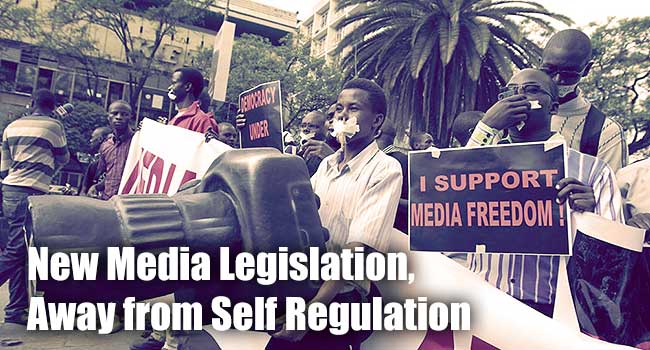New Media legislation, away from Self Regulation

One of the key rights and freedoms that have been promoted in line with achieving a free and democratic society where the rule of law is observed and upheld is the freedom of the Expression. In this regard, this freedom is directed mainly towards the press. The freedom of the press is a pivotal component of our individual development – as human beings and as "political animals" – to improve and radicalize democracies.
Freedom of expression has long been regarded as a fundamental right, which also helps to defend other rights and freedoms.
Despite petitions, lobbying and peaceful demonstrations by journalists in Kenya, the National Assembly passed what has been referred to as a 'draconian' Media Bill without making any amendments to controversial clauses identified by stakeholders. Journalists decried the legislation as an attempt to gag the media in an effort to deprive them of their Constitutional rights.
The move to pass the bill means that under the Kenya Information and Communications Bill, which now awaits presidential assent, journalists as well as media houses will be subjected to the watch of a quasi-government body. Media houses will be fined a maximum of twenty million shillings if they contravene these provisions and journalists five hundred thousand shillings. Additionally, the President and the Cabinet Secretary for Information and Communication have been granted the final say in determining the people who would sit in the Communications Authority of Kenya and those to sit in the Communications and Multimedia Appeals Tribunal. These are the two major bodies that will manage the communications sector, regulate content, and punish journalists and media enterprises.
The said Media bill and Kenya Information and Communications Bill (KICA) 2013 are expected to overhaul the media terrain and industry as a whole. The two bills shift the media from a self regulating body to a government controlled institution, meaning therefore that it is lacking the ever important aspect of independence. Criticism of the new laws arises from the powers given to the minister to dissolve the Media Council and the board of CCK and establish mechanisms for appointment of their successors. The same Minister would, under the new law, have the power to reject any proposed nominees and can instigate their dismissal. The Media Council (Amendment) Bill also gives the minister the power to amend the Code of Ethics for journalism. The Argument is that the Journalism profession should be controlled by professionals and these laws exclusively take these powers away from journalists as a profession.
As a state gearing towards becoming a purely democratic society, it is important that the independence of the media is guaranteed under the new constitution.
The freedom of the press is closely linked to the idea of democracy. Without freedom of the press then a democratic society does not exist in reality. Hence, mass media as an instrument for the exercising of freedom of speech and expression gains importance for a democratic society. Just like the other three arms of government, the principle of independence and non-interference of the press and media should also apply.


